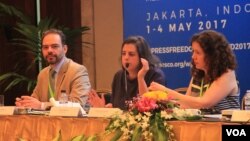[Editor’s Note: On World Press Freedom Day this month, UNESCO brought together more than 1,000 people from NGOs, human rights defenders, journalists and media workers to Jakarta, Indonesia, to discuss the regional press freedom situation. On the sidelines of the event, VOA Khmer’s Hean Socheata spoke to Sophie Busson of Reporters Without Borders about the situation of press freedom in Southeast Asia and Cambodia.]
VOA: Reporters Without Borders released its World Press Freedom Index last week noting that the Southeast Asia is the worst region for press freedom. So in your understanding what are the main reasons behind the low rank?
Sophie Busson: Thank you for your question. Indeed, Reporters Without Borders issued the World Press Freedom Index last week, and we could see that the situation in the countries in the Southeast Asia is very poor. We saw so many attacks against journalists, and some laws against journalists. It’s very difficult to access freedom of expression in these countries.
VOA: Why is the index important?
SB: I believe that to have this index could help journalists and the media to go to the government and to say ‘look, we need to have an improvement regarding the press freedom situation or the world would be looking at us’. I think so many diplomats are also looking at the press freedom index and will talk about this occupation with authorities and the government, so this can help put pressure on the authority. And we hope that the index could help journalists on the ground be able to work freely.
VOA: Cambodia dropped four ranks in the index this year. Can you explain the reasons why?
SB: What we see in Cambodia is that the media are really under the close watch of the government led by Prime Minister Hun Sen, who maintains good relations with the leading media owners. There is growing hostility to independent media, especially in 2016. And journalists can pay a high price when they want to cover illegal logging or trafficking in fish or other natural resources. We also know that the defamation and damaging the country’s image are the most frequently used charges. And shortly after well-known political commentator Kem Ley’s murder in July 2016, the Phnom Penh Post, Cambodia Daily, and other media outlets were fiercely criticized by relatives of the Prime Minister and they all received anonymous threats. This is the reason why the score of Cambodia decreased in the index this year.
VOA: How could this affect the democratic process in the run up to elections in June?
SB: This is very worrying because the media is not free to do their work during the election campaign. During the election campaign, it’s very important to have free media to cover the campaign and cover the issues that citizens need to be informed about in order to know who to vote for.
VOA: Huot Vuthy, the deputy director of Radio Free Asia’s Khmer service, was recently accused of hiding his identity as a journalist to enter a prison and interview political prisoners. How could this case affect media freedom in Cambodia?
SB: We’re very preoccupied with this case. It’s not normal for him not to be able to exercise freely, that’s why we really have to call on the authority to let journalists work on their job freely in Cambodia. This is very important to understand: when they take legal action against journalists, that it can lead to self-censorship in the country. It can have an impact and create fear for those who want to express themselves freely. So it will diminish press freedom in the country and then it will harm all civil society.
VOA: How could Southeast Asian countries improve press freedom?
First, journalists must be free to express themselves. The laws have to guarantee their freedom of expression. And officials and politicians must refrain from attacks on the media. There should be no limits for journalists to do their job. There should also be the economic condition for media to be sustainable, so this is a real responsibility for government and political leaders to create a positive environment for media and journalists to do their job.
This interview has been edited for length and clarity.







